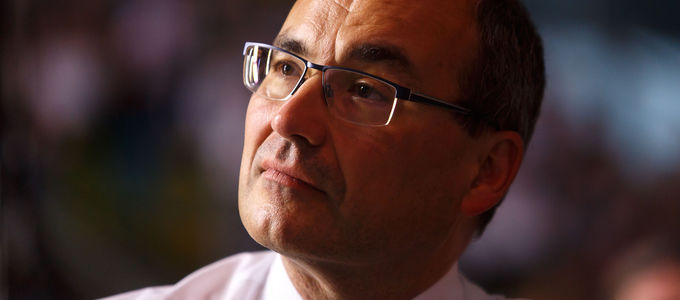
A three-part interview—and that is only a beginning. Because the Chief Apostle has a lot more to say. How all this fits together and what is behind it: here is a review.
“Focus on the essentials,” is what Chief Apostle Jean-Luc Schneider issued as a motto in his strategic interview. This puts him right in line with his predecessors Hans Urwyler, Richard Fehr, and Wilhelm Leber.
And what are the essentials? Salvation of course. “Our primary goal is to preach the gospel truthfully and conscientiously throughout the world.” The basis for this is the Bible: it must be the basis of our teaching and the sermon. However, occupying oneself with Scripture is not only important for the ministers, but also for the congregation, as the Chief Apostle recently said in a divine service: “Let us take the trouble and get to know the Bible better so that the Holy Spirit can build on our knowledge in the sermon and thereby strengthen and comfort us through the word.”
Salvation is everything!
Essential for the Chief Apostle is always what is crucial for the salvation of the believers. Everything else takes second place: church traditions, the importance of individuals, even the organisation itself. “As Apostles and messengers for Christ we do not fight for the survival of the New Apostolic Church, but for the Lord Jesus Christ!” he already said in 2013. And now: “Our mission is going to people and making them into disciples of the Lord, not members of the Church.”
That Church traditions once had a different status than today, the Chief Apostle knows only too well. We encouraged believers to follow certain “apostolic patterns” in such things as music, dress, teaching methods, or even organisational aspects.” He is aware of the consequences: “The Church apologises for the mistakes that were made in the past.” And: “Forgive us if we have hurt you, if we have disappointed you.”
Today we “increasingly try to take cultural differences into account.” Because: “The New Apostolic faith can be practised within the most diverse of cultures.” In fact, the Chief Apostle recently said: “We need our differences.” It is the interaction of these differences that makes a strong team. Unity in teaching, cultural diversity in exercising our faith: that is the maxim.
Convince rather than decree
The Chief Apostle also sees one of his tasks in adapting the structure and organisation of the Church to the present needs. These current requirements are: improved communication, simpler decision-making, greater reliance on individual competencies, and more consideration for the living conditions of an increasingly mobile society.
He wants to react with clearly defined responsibilities, firmly outlined duties, and greater flexibility. Shared leadership is important to him, which can only work within a lean management structure. Finally, he wants ministerial authority to be as clearly separated from organisational responsibility as the message of the gospel from Church regulations or local traditions.
And this is not only the case for the District Apostle. One may not use the authority of the ministry to justify organisational decisions, the Chief Apostle says, and draws the red line between rules and commandments. “We must be able to explain such rules. There must be a good reason for them. We have to convince people.”
Together with the ministers, all the members of the Church have the same mission: to make sure that people feel at home in our Church, that they can experience the love of God and the joy of serving Him and others, and feel a desire to bring their lives into alignment with the gospel.
Photo: Marcel Felde




